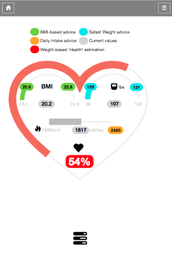
How your body and mind understand the states of "emergency"
Stress can cause weight gain, they are both related to each other, like "cousins". In the first part of this series, we explored a very common psychological reaction to stress – emotional eating. Now, we dive into a physical response, triggered by the hormone cortisol.
--> Stress and Weight Gain - Part 1 <--
Cortisol, chronic stress, and weight gain
Cortisol is an important hormone that holds many functions within the body. It acts as an anti-inflammatory agent and mobilizes glucose reserves to be transformed into available energy – so you can see why your body would secrete cortisol in higher quantities when facing an emergency. This mechanism that evolved to help us survive is, sadly, not well suited to the chronically stressful environment in which we function nowadays. Cortisol dysfunction can actually increase inflammation and pain, and can have many negative effects on long term health (1).
But how does cortisol link stress and weight gain?
Cortisol raises your blood sugar level, as glucose (a type of sugar) is your body’s main fuel. All that available glucose needs to either be used or go back into storage. This means releasing another hormone – insulin – which takes the glucose to active muscle cells, and stores the excess into fat cells, especially the ones in your gut (also called visceral fat) (2).
High cortisol levels may also lead to overeating, as the consequent rise in insulin “mops up” the glucose from the blood, triggering hunger. While this is not necessarily the same as emotional hunger, cortisol-induced hunger is often associated with craving sweet and fatty foods, leading to another spike in blood sugar, another rise in insulin levels, more visceral fat deposits and so on, in another vicious cycle of stress and weight gain.
Repeated often enough, this mechanism increases the likelihood of developing insulin resistance, type 2 diabetes and cardiovascular disease (3). Therefore, chronic stress and weight gain can lead to illness and death.
So, what to do?
Regular exercise has been proven to help, by using up available glucose, as well as by decreasing overall insulin resistance and improving metabolism. Exercise is also associated with reduced sensitivity and therefore improved resilience towards stressors, promoting both physical and mental wellbeing and breaking the cycle of stress and weight gain.
When you are feeling stressed, tired and generally down, don’t reach for the fridge or the pantry, and make sure you are not eating while watching TV or doing something else. Take a walk to clear your mind, channel your energy into exercise, or reach out to a friend or loved one – BEFORE eating any meal. You can also just drink some water and wait to calm down, or try some other relaxation technique. There are tons of meditation or mindfulness practices out there to help you cope with the immediate situation, and of course therapy is the best way to address underlying issues. Remember, eating doesn’t really help, and in fact can make things worse.
Perhaps breaking the link between your level of stress and weight gain is something to consider for your new year resolutions. What do you think?
- Hannibal, K. E., & Bishop, M. D. (2014). Chronic stress, cortisol dysfunction, and pain: a psychoneuroendocrine rationale for stress management in pain rehabilitation. Physical therapy, 94(12), 1816–1825. https://doi.org/10.2522/ptj.20130597
- Tsatsoulis, A., & Fountoulakis, S. (2006). The protective role of exercise on stress system dysregulation and comorbidities. Annals of the New York Academy of Sciences, 1083, 196–213. https://doi.org/10.1196/annals.1367.020
- Steptoe, A., Kunz-Ebrecht, S. R., Brydon, L., & Wardle, J. (2004). Central adiposity and cortisol responses to waking in middle-aged men and women. International journal of obesity and related metabolic disorders : journal of the International Association for the Study of Obesity, 28(9), 1168–1173. https://doi.org/10.1038/sj.ijo.0802715
By Ioana Vulcan,
Writer Collaborator
--> Stress and Weight Gain - Part 1 <--











Carlos (Monday, 08 February 2021 03:07)
Muy bueno. Gracias Virtual Trainer